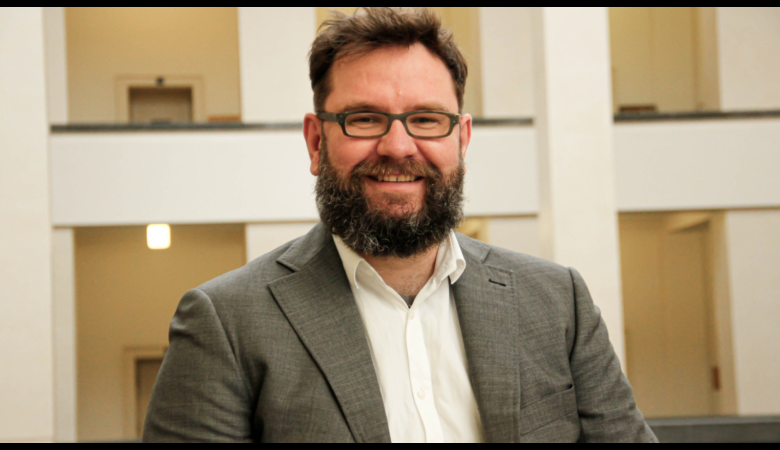Interview with Dr. Sven Hoeppner

Interview with Dr. Sven Hoeppner
Dr. Hoeppner, before we start talking about the JUNIOR STAR grant you received, may I ask about your work position Faculty of Law? I know that you have worked or are working at many universities. How long have you been in Prague and is Department of Economics at Charles University different from the rest of the law schools?
I am roaming the hallways of the Faculty of Law now since October 2019. I've always been close to Prague. I grew up close by in Berlin and my family and me visited Prague many times when I was young. As Prague is such an amazing city and triggers my nostalgia, I was quite delighted when I was offered the opportunity to work at the Faculty of Law at Charles University. More importantly, however, the Department of Economics of the Faculty of Law was the main reason to join the Faculty. You have to understand that the Faculty of Law here at Charles University is actually quite special in featuring an economics department in its walls. Although „Economic Theory of Law“ as an academic discipline has garnered more and more importance since the 1950s and 1960s, there are not many comparable scientific institutions in Europe. Off the top of my head, I can think of three other places at most. This makes the Faculty quite unique and very modern. In addition, I had met the members of the Department of Economics before on conferences in the United States and in Europe. Therefore, I knew that there is an aspiration for and a track record of excellent research. All very good reasons to join.
What was your main motivation to participate in this interesting project (JUNIOR STAR grant from Czech Science Foundation)? Of course, I know you are a capacity in your field, but if you could describe what were your feelings or thoughts you had when applying.
Well, to understand the motivation, we need to go one step back. The people you know as your professors and lecturers actually do not only teach, but do many more things that are hidden from the perception of students. The most important of these other activities is research. Traditional doctrinal legal scholarship does not require many specific resources. We need books, articles, court decisions, and our well-functioning brains. It's rather inexpensive (if you don't need to go abroad). Our research at the department of economics, however, is concerned with how the law works in action, that is, how the law and changes of rules affect behavior of members in society. And we do this research data-based. In other words, we are empiricists. I, specifically, conduct computer experiments in which participants play a game. I change the rules of the game for different groups of participants in order to understand what happens as a consequence of the changed rules. And this kind of research is rather costly because I pay real money to participants according to how they decide in those experiments. The unfortunate reality is that law schools in the EU don't usually have the funds to allocate to research like this. As a consequence, empirical researcher are required and expected to apply for research grants like GACR Junior Star. That's the simple motivation: I need resources to conduct my research.
Now, regarding my feelings and thoughts when applying, you have to understand that these calls for grant applications are extremely competitive. There are many excellent proposals from all kinds of brilliant researchers in many different scientific fields. In many ways, a grant application is like a lottery. But I was passionate about my idea, at the department of economics we put a lot of work into this application, and we received great support from the faculty administration. Despite all these preparations I was extremely nervous and excited about this application. When I eventually learned that the referees also liked my proposal very much, I was beyond happy. And so where the other members at the department of economics. Actually, this great news came one day after my birthday. And I tell you this was a really awesome present.
Your project is planned for five years. Have you thought about how you will proceed in the coming years? Will you have a team for your project or will you work alone?
The project involves high aspirations of mine and during it's duration (5 years) I couldn't do all the work alone. Therefore, for the project we will hire some new researchers: one person that has experience on the intersection of law, economics, and experimental methods; one data scientist; and a research assistant. We are currently extremely busy with preparing the search for the right people to join us. Once we have the team together, we will start with the actual research work. We will accurately define our hypothesis and then design experiments to test our predictions. Then we will conduct these experiments and analyse the data. Eventually, we will publish our findings. That's pretty much the standard way of how scientists (like us) create knowledge for society. And we will go through this loop several times throughout the project. It'll be very work intensive but exciting.
Name and theme of your project is "Human-Machine Transactions: Behavioral Micro-foundations and Legal Implications”. The main goal of the project is to quantify how human behavior changes when artificially intelligent machines are involved in social dilemma situations and coordination problems. A subsequent goal is to draw policy implications to smooth the transition to machine-driven economies/societies. Could you please describe it in more detail?
I think completely describing the aims of the project and how we want to fulfill them in all the nitty-gritty detail will be too much (and maybe boring) for the purpose of our little talk. But I will gladly give you a little sneak-peak by way of example.
One of the social dilemma situations we are investigating is the so-called "public goods game" (PGG). In the public goods game a group of players, let's say four, all have some money to start with, let's say 250 CZK. Each of the players decides how much of that money she or he wants to contribute to a "group pool". And they decide this without knowing what the other players decide. Now, money contributed to the group pool is more valuable to the society of four players than the money they keep to themselves. Let's say we double whatever amount players contribute to the group pool. So, if you put in 100 CZK to the pool and keep 150 CZK, the 100 CZK are doubled. After every player made her or his contribution decision and the amount in the pool was doubled, the amount in the group pool is distributed equally among the group members. Actually a very simple game, right?
The twist is as follows. For each player individually, it is the best (rational) strategy to never put anything into the group pool. So if players are rational, the group pool will always be zero. However, for the society of players it would be optimal if we could ensure that every player contributes all her or his money to the group pool. (You can run through the numbers yourself, this would take too long here.) And that's the social dilemma. The group in its entirety would be best off if everybody gave everything, but individually it is best to keep everything.
If you look closely, you can actually find this kind of game structure a lot in the real world. Think about public transportation (without the state financing it), your last group-work with other students, or – very topical right now – fireworks. (Happy new year everybody!) Personally, I never buy a lot of fireworks for the new year celebration because others go nuts on fire crackers, rockets, and all that jazz. So I can enjoy their stuff too without spending money.
And we also observe in experiments that cooperation among players is much less than perfect. While real people are not as non-cooperative as economic agents, the contribution rates go down over time. People learn that it is best for them individually to not contribute. It would be great for society, if we had some institution that helps us to make people cooperate all the time. Fortunately, researchers found out that "altruistic punishment" helps to sustain cooperation in these games. So, imagine there is an additional player who has 1000 CZK. And all he can do is to observe what the group is putting into the pool. And if that person thinks that another player put in too little, he can give up some of her or his CZK and by doing so also take away money that other players keep to themselves. So, this person can punish other players, but such punishment is costly for her too. And this altruistic punishment has been shown to keep contribution levels in the PGG quite stable, which is great.
Now, what does that have to do with our project? Well, let's think about the legal context and specifically about robotic judges. We already have robotic judges (essentially machine learning or even artificial intelligence driven algorithms) taking over some steps in civil, administrative, or criminal settings. In some US states algorithms recommend criminal sentences. In some US states automated algorithms serve as ultimate decision makers that for instance, stop welfare benefits or target people for air travel exclusions. Outside the US, Estonia is actually preparing an artificial intelligence program to decide about small claims cases. This is no science fiction, mind you.
So what happens if we replace our additional player in the PGG, who can punish other players if they don't contribute enough, with an algorithm that takes over this function? I told you that the human judge helps to facilitate cooperation levels through the mere possibility of punishment. If the players fear take the punishment into account when making their contribution decisions, then actually punishing them may not be necessary, at least not to a large extent. However, will the players also react this way if the robot judge will take over this function? I am not sure. For instance, the players may be concerned about their social image when a human evaluates their actions. When a robot decides, this concern may go away because a machine decides. If that is true, what kind of additional procedural steps do we need to take to improve the situation again?
These are the questions that we are concerned with in this project. I hope this helps. If not, anybody please feel invited to reach out and talk to me. It would be my biggest pleasure.
Dr. Hoeppner, thank you very much for the opportunity to interview you. I wish you much continued success.
Thank you too. It was a pleasure.
Interviewer:
Pavel Nesit, Editor of the Communication and Public Relations Department








